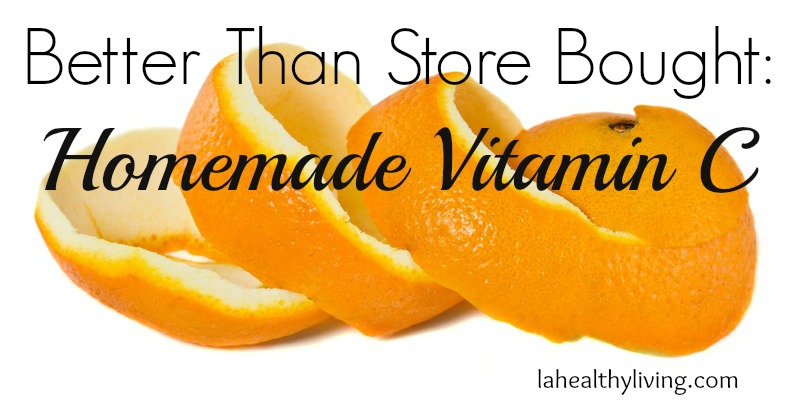Vitamin C is definitely best known for its ability to strengthen the immune system. However, Vitamin C also has many other important benefits for our health. Vitamin C is a potent antioxidant that fights free radicals responsible for skin aging and dryness. According to the latest scientific research, Vitamin C leads to more effective skin regeneration and protects the skin from DNA damage. Vitamin C detoxifies our bodies and aids in the healing of all of our cells. Unfortunately, most people do not get enough of Vitamin C to reap all the wonderful properties it has to offer.
Why Should You Make Your Own Homemade Vitamin C?
First of all, most store bought Vitamin C supplements are genetically modified. Manufacturers use genetically modified corn as one of the ingredients. Most commercial vitamin C supplements do not contain natural vitamin C. It’s often made from ascorbic acid which is a synthetic chemical derived from glucose. Ascorbic acid has been proven to destroy good bacteria in the gut and suppress the immune system.
Health Benefits of Orange Peels
- One medium orange contains over 60 flavonoids and 170 different phytonutrients.
- Orange peel improves digestion. It helps to releive gas, heartburn, vomiting and acidic eructation.
- Orange peel helps with the respiratory system; it helps eliminate cough and even can improve asthma.
- Orange peels have anti-microbial and anti-inflammatory properties. Essential oil, d-limonene, contained in orange peels has ability to promote normal liver function.
How to Make Vitamin C
Making Vitamin C at home is super easy and won’t cost you anything.
- Take organic orange peels and cut them into strips
- Allow the peels to dry at room temperature for a couple of days until crisp
- Once dried, grind the orange strips in any grinder ( I use a coffee grinder)
- Take one teaspoon daily ( I add it into my daily smoothies)
- Be sure to store in an airtight container.
One teaspoon of powdered orange peels will provide you with more Vitamin C than your body needs.
This content will be shown after all post

Hello, I as wondering have you tried to use this in a beauty recipe such as a serum?
Hi Delma! Yes. You can definitely use in a serum. It’s very beneficial for your skin as well.
Great info! Could you also use a dehydrator for the orange peels? Or even just use pure orange essential oil instead?
Hi Amy! Yes, you can use dehydrator. You can alsouse orange essential oil; it’s just much more concentrated.
Could you get the same benefits from lemon peels?
Do I use the pith and the peel altogether? Or cut the peel off thinly, with a vegetable peeler, perhaps? thank you!
This is all great, and excellent info. I think I will start trying this, adding it to smoothies, maybe yogurt? The only question I have is, besides what else would be good to add the powder to, is if it’s providing more Vitamin C than a body needs, then could that cause some issues? Our body can absorb so much, and then it’s wasted. Ideally there would be Vitamin C in some foods also, like what is in a smoothie for example. What’re your thoughts, could I maybe add a bit less?
Hi Nicolette! According to the Office of Dietary Supplements, you can safely consume up to 2000 mg. It’s a huge number; you will never go over the limit. The great thing about natural homemade Vitamin C is that it contains live enzymes that allow the vitamin C to be 100% assimilated into your body.
Do you have any references to show that ascorbic acid destroys good bacteria in the gut? Also, how much vitamin C do you get with 1 tsp?
Hi Loretta! Here is a reference http://www.naturalnews.com/040147_vitamin_c_ascorbic_acid_synthetic_vitamins.html
Hi! I know they are not as concentrated in C, but would this work with grapefruits, I am allergic to oranges, AND corn, so I cannot tolerate ANY of the Vit C’s on the market, even the high quality good brands, non-gmo stuff.
Can you tell me how many milligrams of vitamin C are in a teaspoon on this,.. roughly? Thanks so much for you help!! 🙂